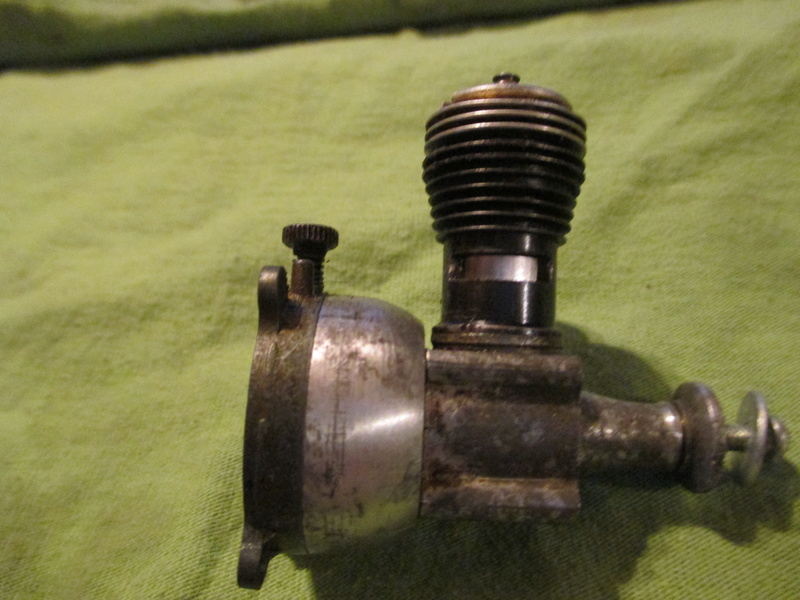Log in
Search
Latest topics
» Tee Dee .020 combat modelby Ken Cook Today at 5:09 am
» Roger Harris revisited
by TD ABUSER Today at 2:30 am
» My latest doodle...
by batjac Yesterday at 10:05 pm
» Retail price mark-up.. how much is enough?
by gkamysz Yesterday at 9:29 pm
» Happy 77th birthday Andrew!
by roddie Yesterday at 9:22 pm
» My N-1R build log
by GallopingGhostler Yesterday at 3:04 pm
» Chocolate chip cookie dough.........
by roddie Yesterday at 1:13 pm
» Purchased the last of any bult engines from Ken Enya
by sosam117 Yesterday at 11:32 am
» Free Flight Radio Assist
by rdw777 Yesterday at 9:24 am
» Funny what you find when you go looking
by rsv1cox Wed Nov 20, 2024 3:21 pm
» Landing-gear tips
by 1975 control line guy Wed Nov 20, 2024 8:17 am
» Cox NaBOO - Just in time for Halloween
by rsv1cox Tue Nov 19, 2024 6:35 pm
Cox Engine of The Month
engine cleaning
Page 1 of 1
 engine cleaning
engine cleaning
I have read not to clean engines with WD40 after running. Can someone tell why and what to use?

chevyiron420- Gold Member

- Posts : 251
Join date : 2015-01-28
Age : 66
Location : Barney Georgia
 Re: engine cleaning
Re: engine cleaning
Water Displacing recipe 40 is good for a lot of things but it is NOT a good after run oil or long term preservative oil
Basically it evaporates away leaving a gummy film that will harden over time much like Castor oil
It will NOT hurt anything to hose down a, "just run" engine with WD40, but there are better (and lower cost) solutions
I personally use 91% isopropyl Alcohol and compressed air followed by a drop or two of Air Tool Oil for engines that are to be run this flying season...
Others, in longer term storage, get a more comprehensive cleaning, drying, and Then the Air Tool Oil
There are all sorts of concoctions guys swear by for a good After Run Oil (ARO)
I took the don't have to mix route and just use Marvel Mystery brand's AIR TOOL OIL...
For end of day quick engine cleaning there are also all sorts of favorites... but some are a tad harsh for plastic parts, or paint finish
The most expensive I used was a spray can of B12 chemtool.. but way over kill IMO but fairly easy on paints and plastic parts
I grabbed carb cleaner on time by mistake and that stuff is too hot destroying the nose finish on the model
I never tried the milder brake parts cleaners as I don't have any but have heard guys that say it is OK to use
Basically it evaporates away leaving a gummy film that will harden over time much like Castor oil
It will NOT hurt anything to hose down a, "just run" engine with WD40, but there are better (and lower cost) solutions
I personally use 91% isopropyl Alcohol and compressed air followed by a drop or two of Air Tool Oil for engines that are to be run this flying season...
Others, in longer term storage, get a more comprehensive cleaning, drying, and Then the Air Tool Oil
There are all sorts of concoctions guys swear by for a good After Run Oil (ARO)
I took the don't have to mix route and just use Marvel Mystery brand's AIR TOOL OIL...
For end of day quick engine cleaning there are also all sorts of favorites... but some are a tad harsh for plastic parts, or paint finish
The most expensive I used was a spray can of B12 chemtool.. but way over kill IMO but fairly easy on paints and plastic parts
I grabbed carb cleaner on time by mistake and that stuff is too hot destroying the nose finish on the model
I never tried the milder brake parts cleaners as I don't have any but have heard guys that say it is OK to use

fredvon4- Top Poster


Posts : 4012
Join date : 2011-08-26
Age : 69
Location : Lampasas Texas
 Re: engine cleaning
Re: engine cleaning
If the engine does not need disassembly because of a close encounter with the flying field/unplanned landing, I typically use brake cleaning spray that is sold in auto parts stores. It effectively blows the dirt from the engine, dilutes castor and leaves the surface clean.
If disassembly for a more thorough cleaning is needed, or to degrease the cylinder inside before e.g. devarnishing, I usually snatch the nail polish remover bottle from the toiletries of my wife, and put a few drops of acetone-based fluid on an earbud to access and clean the cylinder and other engine parts.
Then a few drops of Bernie's after run oil will suffice for corrosion protection and lubrication until the next start-up.
If disassembly for a more thorough cleaning is needed, or to degrease the cylinder inside before e.g. devarnishing, I usually snatch the nail polish remover bottle from the toiletries of my wife, and put a few drops of acetone-based fluid on an earbud to access and clean the cylinder and other engine parts.
Then a few drops of Bernie's after run oil will suffice for corrosion protection and lubrication until the next start-up.

balogh- Top Poster



Posts : 4958
Join date : 2011-11-06
Age : 66
Location : Budapest Hungary
 Re: engine cleaning
Re: engine cleaning
Yes, WD-40 is bad news for model engines. I made the mistake years ago of thinking it would preserve my long term retired engines (mostly Cox at the time). Months later I found them as Fred expressed totally gummed up and unusable without a total disassemble and cleaning before I could run them again.
Today after running a clean engine I spray it down with Remoil including in the exhaust ports and venturi flipping it over several times and blowing out with compressed air. No more problems since.
Bob
Today after running a clean engine I spray it down with Remoil including in the exhaust ports and venturi flipping it over several times and blowing out with compressed air. No more problems since.
Bob

rsv1cox- Top Poster




Posts : 11248
Join date : 2014-08-18
Location : West Virginia
 Re: engine cleaning
Re: engine cleaning
Anything is better than nothing.
WD40 is , as said previously (and everything that has been said is correct), primarily a water dispersant
A lot depends on how long and engine will remain unused.
With diesel engines that simply love castor oil - I run through a fuel mix with synthetic oil for a couple of minutes. This removes the remnants of castor oil without devarnishing. Longer runs will devarnish (if thought necessary) but care needs to be taken not to let the engine overheat. That is followed by a couple of drops of after run oil although I have used fine oils like sewing machine oil and gun oil.
I do the same with glow engines but I mix my own fuels and have quite a variety.
Typically fresh castor fuel (without starting the engine) is a good solvent for medium term storage (Do not do this with a diesel - it will fire up as you turn over the engine!)
However, there is an issue with glow fuels that affects 4 stroke engines noticeably. Glow fuel is quite good at absorbing water and during the combustion process can form nitric acid, nitric acid and aluminium don't get on with each other. WD40 will rid this and as an expedient is perfectly fine but not for long term storage.
Quite a few engines pass my way and I have to say that I have only seen a handful that have shown signs of acid attack. These engines have been otherwise pristine - they hadn't been run long enough for castor fuel to protect them or they had been run only with synthetic oil and then left.
Where castor oil has been involved - a couple of drops of after run oil works well. A few years storage and the engine will gum up.
Over cleaning, particularly on steel/cast iron cylinders/liners can be a bad idea removing all the varnish.
I do recommend though - regular oiling and turning the engines over but not with new ABC type piston/liners. Don't go over compression on these.
WD40 is , as said previously (and everything that has been said is correct), primarily a water dispersant
A lot depends on how long and engine will remain unused.
With diesel engines that simply love castor oil - I run through a fuel mix with synthetic oil for a couple of minutes. This removes the remnants of castor oil without devarnishing. Longer runs will devarnish (if thought necessary) but care needs to be taken not to let the engine overheat. That is followed by a couple of drops of after run oil although I have used fine oils like sewing machine oil and gun oil.
I do the same with glow engines but I mix my own fuels and have quite a variety.
Typically fresh castor fuel (without starting the engine) is a good solvent for medium term storage (Do not do this with a diesel - it will fire up as you turn over the engine!)
However, there is an issue with glow fuels that affects 4 stroke engines noticeably. Glow fuel is quite good at absorbing water and during the combustion process can form nitric acid, nitric acid and aluminium don't get on with each other. WD40 will rid this and as an expedient is perfectly fine but not for long term storage.
Quite a few engines pass my way and I have to say that I have only seen a handful that have shown signs of acid attack. These engines have been otherwise pristine - they hadn't been run long enough for castor fuel to protect them or they had been run only with synthetic oil and then left.
Where castor oil has been involved - a couple of drops of after run oil works well. A few years storage and the engine will gum up.
Over cleaning, particularly on steel/cast iron cylinders/liners can be a bad idea removing all the varnish.
I do recommend though - regular oiling and turning the engines over but not with new ABC type piston/liners. Don't go over compression on these.

ian1954- Diamond Member

- Posts : 2688
Join date : 2011-11-16
Age : 70
Location : England
 Re: engine cleaning
Re: engine cleaning
I have after run oil that I am happy with. I am asking about cleaning the outside of the engine after running it to lean off all the oil, but also to protect from oxidation. My engine crankcases are getting darker in color as time goes by and I wondered if the WD40 was causing it. Some of my engines are almost black.



chevyiron420- Gold Member

- Posts : 251
Join date : 2015-01-28
Age : 66
Location : Barney Georgia
 RE: Engine cleaning
RE: Engine cleaning
Be careful with using isopropyl alcohol to clean any engine with ball bearings !!
The 91% isopropyl has 9% purified water as its inactive ingredient to make a 100% liquid.
The cheaper 70% alcohol has 30% water, etc....
WATER AND BALL BEARINGS DO NOT MIX WELL !!
I personally use carb cleaner to clean all engines with no plastic components since it is made for aluminum/zinc/pot metal.
It's stronger and more toxic than break cleaner but proper care and eye protection are mandatory for any chemicals.
As noted earlier, Marvel Mystery Air Tool is, IMO, the best after run and storage oil since it has rust inhibitors and WD40 water displacement additives. Some swear by ATF also since neither have solids in suspension that gum up over time...
YMMV....Steve...
The 91% isopropyl has 9% purified water as its inactive ingredient to make a 100% liquid.
The cheaper 70% alcohol has 30% water, etc....
WATER AND BALL BEARINGS DO NOT MIX WELL !!
I personally use carb cleaner to clean all engines with no plastic components since it is made for aluminum/zinc/pot metal.
It's stronger and more toxic than break cleaner but proper care and eye protection are mandatory for any chemicals.
As noted earlier, Marvel Mystery Air Tool is, IMO, the best after run and storage oil since it has rust inhibitors and WD40 water displacement additives. Some swear by ATF also since neither have solids in suspension that gum up over time...
YMMV....Steve...

66 Malibu- Gold Member

- Posts : 477
Join date : 2012-02-28
Location : Georgia
 Similar topics
Similar topics» Engine cleaning
» This OKAY for engine cleaning
» Your favorite dried out glow fuel solvent?
» Engine cleaning
» Tip: engine disassembly/cleaning
» This OKAY for engine cleaning
» Your favorite dried out glow fuel solvent?
» Engine cleaning
» Tip: engine disassembly/cleaning
Page 1 of 1
Permissions in this forum:
You cannot reply to topics in this forum

 Rules
Rules






